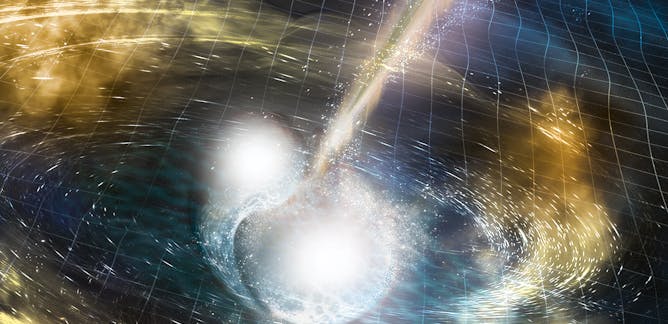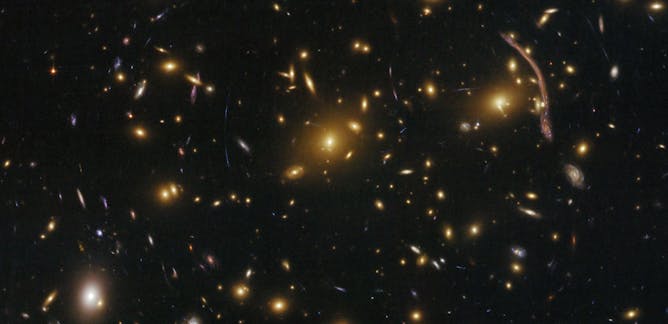| |
|
|
|
|
|
|
| |
|
Editor's note
|
|
Everything exists in the vast, dark place we call space. But what is it? If we sucked all of the matter out of the universe, would space itself be left behind? That’s a question philosophers have pondered for the last 300 years. Modern physics explains how we should think of “spacetime” and how objects move through it. But philosophers argue that these ideas are compatible with several different notions of what space actually is – be it an actual, physical entity, a relation between things or a concept to help us make sense of the world.
The fact that there’s no consensus on what space actually is doesn’t mean we can’t measure it. This week scientists reported the extraordinary observation of gravitational waves from a violent collision of ultra-dense stars more than 100m light years away that shook the very fabric of space itself. And there’s also been progress on understanding the mysterious, invisible part of space that scientists have dubbed “dark matter”. It turns out that the new method to weigh galaxy clusters can help shine a light on this mysterious
phenomenon.
Other great stories we’ve had this week include how dogs are trying to communicate with facial expressions, how culture is informing technological innovations in Japan and a new discovery which could lead to slowing down the progression of Parkinson’s.
|
Miriam Frankel
Science Editor
|

|
|
Top story
|

Pexels
Emily Thomas, Durham University
Some philosophers believe space is a giant container, while others think it's all in our heads.
|
|
|

Martin Hendry, University of Glasgow
The discovery of tiny ripples in space from the violent collision of dense stars could help solve many mysteries – including where the gold in our jewellery comes from.
| |

James Geach, University of Hertfordshire
Galaxies evolve in mysterious way. But a new study offers a fresh approach to understand them.
|
|
|
Health + Medicine
|
-
Miratul Muqit, University of Dundee
There's optimism that the identification of genes linked to Parkinson’s could lead to better treatments.
-
Isabel de Salis, University of Bristol
What if the menopause was something we thought positively about or were able to discuss openly without fear of derision?
|
|
Business + Economy
|
-
Jonathan Perraton, University of Sheffield
New statistics show the UK has half a trillion pounds less in its account than previously thought.
-
Abhinay Muthoo, University of Warwick; Siobhan Benita, University of Warwick
A 'no deal is a good deal' strategy needs to be carefully executed.
|
|
Science + Technology
|
-
Jan Hoole, Keele University
It can be easy to tell how dogs are feeling but new evidence suggests they're also trying to communicate.
-
Stuart Thompson, University of Westminster
New research shows bees see a blue halo around flowers thanks to nanostructures on its petals.
-
Esperanza Miyake, Manchester Metropolitan University
How culture can inform technological innovations.
|
|
Politics + Society
|
-
Ra Mason, University of East Anglia
How did a man once suspected of dubious far-right sympathies end up on the threshold of a record third term?
-
Ellen Wiles, University of Stirling
All the signs were there when I was living in Myanmar at the rosiest moment in the transition to democracy.
-
Alex Simpson, University of Brighton
Not-so-fun fact: more than half of 18- to 34-year-olds are in debt, owing over £8,000 each on average.
-
Imran Awan, Birmingham City University; Irene Zempi, Nottingham Trent University
Sikhs, Hindus and men with beards have reported anti-Muslim hate crime.
|
|
Environment + Energy
|
-
Alexander Roberts, University of Leeds
Very few Atlantic hurricanes travel northwards like this.
-
Joshua P Twining, Queen's University Belfast
Deforestation has wiped out most other predators, so the lizards have lots of food and little competition.
-
Sev Kender, University of Exeter
Warm waters run very deep.
|
|
Arts + Culture
|
-
Arun Sood, Plymouth University
He took a remarkable stand against slavery in the countdown to the American Civil War – but opinion differs about his methods.
-
Richard Marggraf-Turley, Aberystwyth University
Keats's Winchester walk was no idyllic stroll – he had espionage on his mind.
-
Adam Kelly, University of York
The Booker Prize jury has done us a favour by drawing attention to this book.
|
|
Cities
|
-
Enora Robin, UCL; Emilia Smeds, UCL; Jenny McArthur, UCL
The night time economy goes far beyond pubs and clubs.
|
|
Education
|
-
Alke Gröppel-Wegener, Staffordshire University
Students, don’t turn to essay mills, just learn to write a better paper.
-
Helen L Breadmore, Coventry University
Should children with reading difficulties get their hearing checked?
|
|
| |
Featured events
|

|
Birmingham, Birmingham, B2 5EP, United Kingdom — University of Birmingham
|

|
University of East Anglia, Norwich, Norfolk, NR4 7TJ, United Kingdom — University of East Anglia
|

|
Ivor Crewe Lecture Hall, Colchester, Essex, CO4 3SQ, United Kingdom — University of Essex
|

|
Millennium Library, The Forum, Norwich, Norfolk, NR2 1AW, United Kingdom — University of East Anglia
|
|
|
|
| |
| |
| |
| |
| |
|
|
|
|
|
|
| |